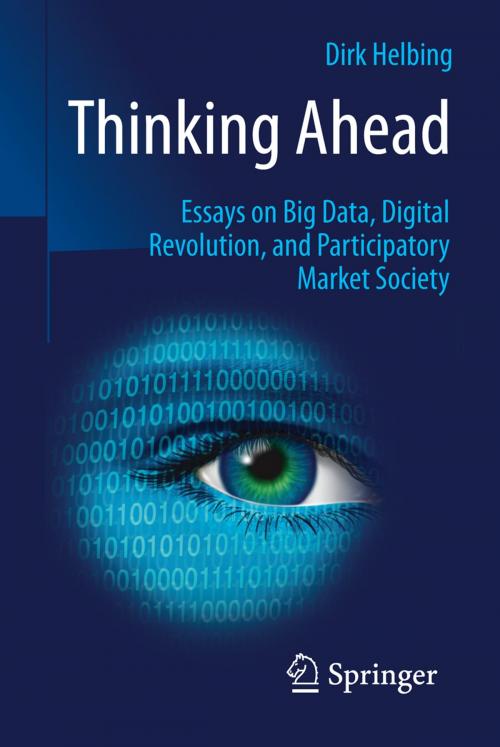Thinking Ahead - Essays on Big Data, Digital Revolution, and Participatory Market Society
Nonfiction, Science & Nature, Science, Other Sciences, System Theory, Computers, Database Management, Data Processing, Social & Cultural Studies, Social Science| Author: | Dirk Helbing | ISBN: | 9783319150789 |
| Publisher: | Springer International Publishing | Publication: | April 10, 2015 |
| Imprint: | Springer | Language: | English |
| Author: | Dirk Helbing |
| ISBN: | 9783319150789 |
| Publisher: | Springer International Publishing |
| Publication: | April 10, 2015 |
| Imprint: | Springer |
| Language: | English |
The rapidly progressing digital revolution is now touching the foundations of the governance of societal structures. Humans are on the verge of evolving from consumers to prosumers, and old, entrenched theories – in particular sociological and economic ones – are falling prey to these rapid developments. The original assumptions on which they are based are being questioned. Each year we produce as much data as in the entire human history - can we possibly create a global crystal ball to predict our future and to optimally govern our world? Do we need wide-scale surveillance to understand and manage the increasingly complex systems we are constructing, or would bottom-up approaches such as self-regulating systems be a better solution to creating a more innovative, more successful, more resilient, and ultimately happier society? Working at the interface of complexity theory, quantitative sociology and Big Data-driven risk and knowledge management, the author advocates the establishment of new participatory systems in our digital society to enhance coordination, reduce conflict and, above all, reduce the “tragedies of the commons,” resulting from the methods now used in political, economic and management decision-making.
The author
Physicist Dirk Helbing is Professor of Computational Social Science at the Department of Humanities, Social and Political Sciences and an affiliate of the Computer Science Department at ETH Zurich, as well as co-founder of ETH’s Risk Center. He is internationally known for the scientific coordination of the FuturICT Initiative which focuses on using smart data to understand techno-socio-economic systems.
“Prof. Helbing has produced an insightful and important set of essays on the ways in which big data and complexity science are changing our understanding of ourselves and our society, and potentially allowing us to manage our societies much better than we are currently able to do. Of special note are the essays that touch on the promises of big data along with the dangers...this is material that we should all become familiar with!” Alex Pentland, MIT, author of Social Physics: How Good Ideas Spread - The Lessons From a New Science
"Dirk Helbing has established his reputation as one of the leading scientific thinkers on the dramatic impacts of the digital revolution on our society and economy. Thinking Ahead is a most stimulating and provocative set of essays which deserves a wide audience.” Paul Ormerod, economist, and author of Butterfly Economics and Why Most Things Fail.
"It is becoming increasingly clear that many of our institutions and social structures are in a bad way and urgently need fixing. Financial crises, international conflicts, civil wars and terrorism, inaction on climate change, problems of poverty, widening economic inequality, health epidemics, pollution and threats to digital privacy and identity are just some of the major challenges that we confront in the twenty-first century. These issues demand new and bold thinking, and that is what Dirk Helbing offers in this collection of essays. If even a fraction of these ideas pay off, the consequences for global governance could be significant. So this is a must-read book for anyone concerned about the future." Philip Ball, science writer and author of Critical Mass
“This collection of papers, brought together by Dirk Helbing, is both timely and topical. It raises concerns about Big Data, which are truly frightening and disconcerting, that we do need to be aware of; while at the same time offering some hope that the technology, which has created the previously unthought-of dangers to our privacy, safety and democracy can be the means to address these dangers by enabling social, economic and political participation and coordination, not possible in the past. It makes for compelling reading and I hope for timely action.”Eve Mitleton-Kelly, LSE, author of Corporate Governance and Complexity Theory and editor of Co-evolution of Intelligent Socio-technical Systems
The rapidly progressing digital revolution is now touching the foundations of the governance of societal structures. Humans are on the verge of evolving from consumers to prosumers, and old, entrenched theories – in particular sociological and economic ones – are falling prey to these rapid developments. The original assumptions on which they are based are being questioned. Each year we produce as much data as in the entire human history - can we possibly create a global crystal ball to predict our future and to optimally govern our world? Do we need wide-scale surveillance to understand and manage the increasingly complex systems we are constructing, or would bottom-up approaches such as self-regulating systems be a better solution to creating a more innovative, more successful, more resilient, and ultimately happier society? Working at the interface of complexity theory, quantitative sociology and Big Data-driven risk and knowledge management, the author advocates the establishment of new participatory systems in our digital society to enhance coordination, reduce conflict and, above all, reduce the “tragedies of the commons,” resulting from the methods now used in political, economic and management decision-making.
The author
Physicist Dirk Helbing is Professor of Computational Social Science at the Department of Humanities, Social and Political Sciences and an affiliate of the Computer Science Department at ETH Zurich, as well as co-founder of ETH’s Risk Center. He is internationally known for the scientific coordination of the FuturICT Initiative which focuses on using smart data to understand techno-socio-economic systems.
“Prof. Helbing has produced an insightful and important set of essays on the ways in which big data and complexity science are changing our understanding of ourselves and our society, and potentially allowing us to manage our societies much better than we are currently able to do. Of special note are the essays that touch on the promises of big data along with the dangers...this is material that we should all become familiar with!” Alex Pentland, MIT, author of Social Physics: How Good Ideas Spread - The Lessons From a New Science
"Dirk Helbing has established his reputation as one of the leading scientific thinkers on the dramatic impacts of the digital revolution on our society and economy. Thinking Ahead is a most stimulating and provocative set of essays which deserves a wide audience.” Paul Ormerod, economist, and author of Butterfly Economics and Why Most Things Fail.
"It is becoming increasingly clear that many of our institutions and social structures are in a bad way and urgently need fixing. Financial crises, international conflicts, civil wars and terrorism, inaction on climate change, problems of poverty, widening economic inequality, health epidemics, pollution and threats to digital privacy and identity are just some of the major challenges that we confront in the twenty-first century. These issues demand new and bold thinking, and that is what Dirk Helbing offers in this collection of essays. If even a fraction of these ideas pay off, the consequences for global governance could be significant. So this is a must-read book for anyone concerned about the future." Philip Ball, science writer and author of Critical Mass
“This collection of papers, brought together by Dirk Helbing, is both timely and topical. It raises concerns about Big Data, which are truly frightening and disconcerting, that we do need to be aware of; while at the same time offering some hope that the technology, which has created the previously unthought-of dangers to our privacy, safety and democracy can be the means to address these dangers by enabling social, economic and political participation and coordination, not possible in the past. It makes for compelling reading and I hope for timely action.”Eve Mitleton-Kelly, LSE, author of Corporate Governance and Complexity Theory and editor of Co-evolution of Intelligent Socio-technical Systems















